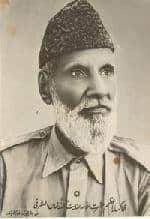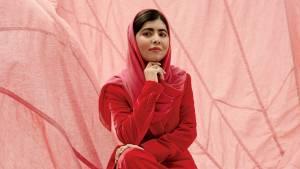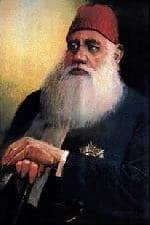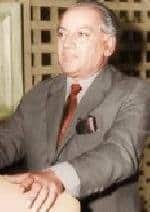Founder of the Khaksar Movement (Tehreek)

Allama Mashriqi also known as Inayatullah Khan born in Amritsar, 25 August 1888; died in Lahore, 27 August 1963, was a Pakistani Islamic scholar and founder of the Khaksar movement.
Mashriqi was a noted intellectual who became a college Principal at the age of 25, and then became an Under Secretary, at the age of 29, in the Education Department of the Government of India. He wrote an exegesis of the Qur’an which was nominated for the 1925 Nobel Prize. He was offered an Ambas-sadorship to Afghanistan at age 32 and Knighthood at the age of 33 years, but he declined all honours.
After three years’ residence at Cambridge he had qualified for his Bachelor of Arts degree, which he took in 1910. In 1912 he completed a fourth tripos in mechanical sciences, and was placed in the second class. He left Cambridge and returned to India in December 1912. During his stay in Cambridge his religious and scientific conviction was inspired by the works and concepts of the professor Sir James Jeans.
Career
On his return to India, Mashriqi was offered the premiership of Alwar, a princely state, by the Raja. He declined owing to his interest in education. At the age of 25 he was appointed Vice Principal of Islamia College, Peshawar, by Chief Commissioner Sir George Roos-Keppel. He was made Principal of the same college in 1917. In Oct 1917 he was appointed Under Secretary to the Government of India in the Education Department in succession to Sir George Anderson (1876–1943). He became headmaster of the High School, Peshawar on 21 October 1919.
Aged 32, he was offered an ambassadorship to Afghanistan, which he declined. The following year, he was offered a British knighthood, which he also turned down. Mashriqi was among the youngest Indians to have been offered such positions.
According to Subroto Roy’s “Lessons from the 1962 War” (published in the Sunday Statesman on January 13, 2008), in 1926 Mashriqi became a friend of Adolf Hitler and later “claimed to have affected Hitler’s ideology.” The same article claims that Mashriqi’s Khaksars were “modelled on the Nazi SA.”
Allama Mashriqi also known as Inayatullah Khan born in Amritsar, 25 August 1888; died in Lahore, 27 August 1963, was a Pakistani Islamic scholar and founder of the Khaksar movement.
Mashriqi was a noted intellectual who became a college Principal at the age of 25, and then became an Under Secretary, at the age of 29, in the Education Department of the Government of India. He wrote an exegesis of the Qur’an which was nominated for the 1925 Nobel Prize. He was offered an Ambas-sadorship to Afghanistan at age 32 and Knighthood at the age of 33 years, but he declined all honours.
He subsequently resigned govern-ment service and in 1930 founded the Khaksar Movement, aiming to advance the condition of the mas-ses irrespective of any faith, sect, or religion. As its leader, he was imprisoned several times. Through his philosophical writings, he asserted that the Science of Religions was essentially the scien-ce of collective evolution of man-kind.
Mashriqi with Khaksars
Family background
Mashriqi was born into an eminent Muslim Rajput family in Amritsar on 25 August 1888. His father, Khan Ata Mohammad Khan, had inherited a large property from his father. His ancestors had held prominent positions during the Mughal Empire. Khan Ata was also well-connected with the Muslim luminaries of the time such as Sir Syed Ahmed Khan, Jamal Ud Din Afgahani, Shibli Nomani, and Mirza Ghalib.
Khan Ata owned a bi-weekly publication, Vakil (“Lawyer”), published from Amritsar. Vakil discussed political issues with a Muslim focus. Shibli Nomani requested that Khan Ata let Abul Kalam Azad work at Vakil. Azad went on to work as an editor of Vakil. Mashriqi was thus raised in an intellectual Muslim environ-ment. Khan Ata Mohammad Khan noticed the genius in his son and he guided him accordingly.
Education
Mashriqi had a passion for mathe-matics from his childhood.He co-mpleted his Master’s degree in Mat-hematics from the University of the Punjab at the age of 19 and broke all previous records. In October 1907 he went to Britain and matri-culated at Christ’s College, Cambridge, to read for the mathematics tripos. He was awarded a college foundation scholarship in May 1908. In June 1909 he was awa-rded first class honours in Math-ematics Part I, being placed joint 27th out of 31 on the list of wranglers. For the next two years, he read for the oriental languages tripos in parallel to the natural sciences tripos, gaining first class ho
In 1930 he was passed over for a promotion in the government service, following which he went on medical leave. In 1932 he resigned, taking his pension, and settled down in Ichhra, Lahore.
Nobel nomination
In 1924, at the age of 36, Mashriqi completed the first volume of his book, Tazkirah. It is a commentary on the Qur’an in the light of science. It was nominated by the Nobel Prize Committee in 1925, subject to the condition it was translated into one of the European languages. Mashriqi, however, declined the suggestion of translation.
Fellowships
Mashriqi’s fellowships included:
Fellow of the Royal Society of Arts, 1923
Fellow of the Geographical Society (F.G.S), Paris
Fellow of Society of Arts (F.S.A), Paris
Member of the Board at Delhi University
President of the Mathematical Society, Islamia College, Peshawar
Member of the International Congress of Orientalists (Leiden), 1930
President of the All World’s Faiths Conference, 1937
Mashriqi’s philosophy
Mashriqi was interested in the conflict within various religions. Instead of getting disgusted with the conflict and discarding Religion, he tried to fathom the fallacy. To him, messengers from the same Creator could not have brought different and conflicting messages to the same creation. He could not conceive of a contradictory and conflicting state of affairs in the Universe, nor could he accept the conflict within various religions as real. Either Religion was a fraud and the prophets were impostors who misguided and disrupted mankind, or they were misprojected by their followers and misunderstood by the mankind.
He delved into the religious scriptures and arrived at the conclusion that all the prophets had brought the same message to man. He analysed the fundamentals of the Message and established that the teachings of all the prophets were closely linked with evolution of mankind as a single and united species in contrast to other ignorant and stagnant species of animals.
It was on this basis that he declared that the Science of Religions was essentially the science of collective evolution of mankind; all prophets came to unite mankind, not to disrupt it; the basic law of all faiths is the law of unification and consolidation of the entire humanity. According to Markus Daeschel, the philosophical ruminations of Mashriqi offer an opportunity to re-evaluate the meaning of colonial modernity and notion of post-colonial nation-building in modern times.
Political life
Mashriqi is often portrayed as a controversial figure, a religious activist, a revolutionary, and an anarchist; while at the same time he is described as a visionary, a reformer, a leader, and a scientist-philosopher who was born ahead of his time.
Mashriqi and the Freedom of British India
After Mashriqi resigned from government service, he laid the foundation of the Khaksar Tehreek (also known as Khaksar Movement) in 1930.He played a role in directing the Muslims towards the independence of British India. Mashriqi was repeatedly imprisoned, along with his family, and a large number of Khaksars.Mashriqi was opposed to the division of South Asia which he believed played into the hands of the British.
Imprisonments and allegations
Mashriqi was first imprisoned in 1939, by the Congress Government of the United Provinces of Agra and Oudh (now Uttar Pradesh) during his efforts in resolving the sectarian conflicts between Sunnis and Shias. In 1940, he was arrested during a clash between the police and the Khaksars. The newspapers reported it as the “battle of spades and guns”. He was only freed from solitary confinement in 1942 after he fasted for 80 days.
On 20 July 1943, an assassination attempt was made on Muhammad Ali Jinnah by Rafiq Sabir who was assumed to be a Khaksar worker. The attack was deplored by Mashriqi, who denied any involvement. Later, Justice Blagden of Bombay High Court, in his ruling on 4 November 1943 dismissed any association of Khaksars.
In Pakistan, Mashriqi was imprisoned at least five times: in 1950 prior to election; in 1958 for alleged complicity in the murder of republican leader Khan Abdul Jabbar Khan; and, in 1962 for suspicion on attempt to overthrow President Ayub’s government. However, none of the charges were proved, and he was acquitted in each case.
In 1957 Mashriqi allegedly led 300,000 of his followers to the borders of Kashmir, intending, it is said, to launch a fight for its liberation. However, the Pakistan government persuaded the group to withdraw and the organisation was later disbanded.
Death
Mashriqi became ill with Cancer and died on August 27, 1963 in Lahore (Pakistan). A gigantic crowd of 100,000 people attended his funeral, reflecting his popularity. Condolences were received from, among others, Ayub Khan and Khwaja Nazimuddin. Ayub Khan wrote that Mashriqi was “a great scholar and organiser who had given up a brilliant academic future to serve the people, as he thought right.”
Nazimuddin wrote that Mashriqi had been “a very interesting figure who took prominent part in the politics of the South Asia”.








